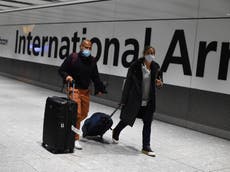‘Freedom passports’ for vaccinated people would risk ‘two-tier society’, Information Commissioner warns
Elizabeth Denham raises fears over ‘identity [cards] by the back door’ - after conflicting statements from ministers
Your support helps us to tell the story
From reproductive rights to climate change to Big Tech, The Independent is on the ground when the story is developing. Whether it's investigating the financials of Elon Musk's pro-Trump PAC or producing our latest documentary, 'The A Word', which shines a light on the American women fighting for reproductive rights, we know how important it is to parse out the facts from the messaging.
At such a critical moment in US history, we need reporters on the ground. Your donation allows us to keep sending journalists to speak to both sides of the story.
The Independent is trusted by Americans across the entire political spectrum. And unlike many other quality news outlets, we choose not to lock Americans out of our reporting and analysis with paywalls. We believe quality journalism should be available to everyone, paid for by those who can afford it.
Your support makes all the difference.Issuing ‘freedom passports’ to people who have been vaccinated would risk creating “a two-tier society”, the information Commissioner has warned.
Elizabeth Denham told MPs of her “concerns” about any such initiative – after ministers made conflicting statements about whether they could be introduced.
“Some of the issues are beyond data protection, they touch on human rights, they touch on whether or not we're going to create a two-tier society based on whether you have a jab in the arm,” she warned.
“And concerns over whether or not this is identity [cards] by the back door.”
In December, Nadhim Zahawi, the vaccines minister, revealed the government was exploring the technology behind so-called ‘freedom passports’ – to confirm a person has had a jab.
There were suggestions the information could be added to the contact tracing app, which millions of people have downloaded, but other ministers have dismissed the idea.
Speaking to the Commons digital committee, Ms Denham said she would demand to know “is it necessary, does it work, does it do what it says on the tin, is it proportionate and is there transparency”.
She added: “For a long time, we have carried vaccination certificates when we go on foreign travel, to show that you've had your typhoid vaccination for example, and that's a piece of paper.
“If we start talking about immunity passports that are digital – are tacked onto the contact-tracing application – then I think those are real, real questions for policy makers.”
The Commissioner acknowledged “vaccine passports of some sort would be useful”, but warned: “People have to trust the government when they bring in these initiatives.
“And make sure, at the end of the day, that their civil liberties, human rights, data protection, are protected.”
Ms Denham also warned of the impact on workers if companies pursued a “no jab, no job” policy, suggesting employment legislation might need to be strengthened.
She also cautioned against against any watering down of EU data protection rules, arguing any government would suffer damage to its “reputation” if it tried.
The Brexit trade agreement removed the immediate threat of businesses losing the ability to share data with the EU, creating a six-month grace period before an “adequacy decision” must be granted.
There have been fears that the General Data Protection Regulation (GDPR) will be watered down – threatening that go-ahead – and Ms Denham strongly defended it.
“The advantage of the GDPR approach is that other countries around the world are using the GDPR as a model to reform their law,” she told MPs.
Arguing the GDPR wrongly “gets a bad rap from people who say it’s just about the paperwork of privacy”, Ms Denham told MPs: “It's more important to the reputation of governments and businesses than it's ever been.”






Join our commenting forum
Join thought-provoking conversations, follow other Independent readers and see their replies
Comments